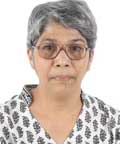HSO-153 Approaching Early Indian History Through Texts (Contact hours: 15) (One-Credit) by Prof. Kumkum Roy, D.D.Kosambi Visiting Research Professor
-
GOA UNIVERSITY
Visiting Research Professorship Programme
D.D. Kosambi Research Chair in Interdisciplinary Studies
And
Dept of History,Goa University
Title of the Course: HSO-153, Approaching Early Indian History Through Texts (Contact hours: 15) (One-Credit)
by
Prof. Kumkum Roy, D.D.Kosambi Visiting Research Professor.
Course Coordinator: Prof N S Bhat, Dept of History
Duration of the Course: From 04.01.2018 to 17.01.2018
Venue: Seminar Hall, Faculty Block – B, Social Sciences and Languages), Taleigao Plateau, Goa University Campus.
Participants: Students and Researchers of History and all those interested in History. THE COURSE IS OPEN FOR PG STUDENTS (as credit course) AND GENERAL PUBLIC (for certificate)
Course contents, contact hours, teaching and evaluation:
The focus of the course will be to introduce learners to some significant textual traditions pertaining to early India, which continue to arouse widespread interest at present. Necessarily selective, the attempt will be to provide a sense of the diversity and richness of these traditions.
Questions that will run through the course will include those of the authorship and chronology of the texts, the intended audiences, the ways in which they were transmitted and preserved, the issues that were represented, strategies of representation and the social milieus in terms of which they may be contextualised.
Outline histories of early India may be used as background material for the course. The following two works are recommended as background reading:
Romila Thapar, Early India: From the Origins to AD 1300, London, Allen Lane, 2002.
Upinder Singh, A History of Ancient and Early Medieval India, New Delhi, Pearson, 2008.
The course will consist of seven interactive lectures of two hours each, and an open book assessment exercise of one hour.
Session – 1: Sacrifices and their Significance – Discussion on Vedic literature in terms of composition, chronology, contents, transmission; case study of either the asvamedha or the rajasuya based on later Vedic excerpts.
Additional reading: Michael Witzel (ed.), Inside the Texts, Beyond the Texts: New Approaches to the Study of the Vedas, Cambridge, Dept of Sanskrit and Indian Studies, Harvard University, 1997.
Excerpt on the asvamedha from Julius Eggeling,(tr.) The Satapatha Brahmana, Part V, Delhi, Motilal Banarsidass, (part of the Sacred Books of the East Series), 1963.
( Lecture for1hr.and15minutes + discussion for 45minutes = 2hrs.)
04.01.2018 from 2.30p.m. to 4.30p.m.
Session – 2: Defining the Domestic – the codification of rites of passage; case study of marriage based on the Grhyasutras.
Additional reading: Jaya S. Tyagi, Engendering the Early Household: Brahmanical Precepts in the Early Grhyasutras, Middle of the First Millennium BCE, New Delhi: Orient Longman, 2008.
Excerpt on marriage rituals from H. Oldenberg (tr.), The Grhya Sutras, Part I, Delhi, Motilal Banarsidass, (part of the Sacred Books of the East Series), 1964.
( Lecture for1hr.and15minutes + discussion for 45minutes = 2hrs.)
05.01.2018 from 2.30p.m. to 4.30p.m.
Session – 3: Dialogues and Dissent – the early Upanisads and early Buddhist tradition; case study on varna based on the excerpts from the Digha Nikaya.
Additional reading: Brian Black and Laurie Patton (eds.), Dialogue in Early South Asian Religions: Hindu, Buddhist and Jain traditions, London, Ashgate, 2015.
T.W. Rhys Davids (tr.), The Dialogues of the Buddha, Delhi, Motilal Banarsidass, 1973. (excerpt from the Tevijja Sutta).
( Lecture for1hr.and15minutes + discussion for 45minutes = 2hrs.)
08.01.2018 from 2.30p.m. to 4.30p.m.
Session – 4: Genres of poetry – the adikavya; case study based on excerpts from the Valmiki Ramayana.
Additional reading: Robert P. Goldman, Introduction, The Valmiki Ramayana, Delhi, Motilal Banarsidass, Excerpt from the Aranyakanda, same series, translated by Sheldon Pollock.
( Lecture for1hr.and15minutes + discussion for 45minutes = 2hrs.)
09.01.2018 from 2.30p.m. to 4.30p.m.
Session – 5: Historical consciousness – a discussion on the Rajatarangini.
Additional Reading: Kumkum Roy, The Power of Gender, the Gender of Power, selected articles, New Delhi, Oxford University Press, 2010.
Excerpts from the translation of the Rajatarangini, M.A. Stein, Delhi, Motilal Banarsidass.
( Lecture for1hr.and15minutes + discussion for 45minutes = 2hrs.)
11.01.2018 from 2.30p.m. to 4.30p.m.
Session – 6: Plays and Playwrights – the performative traditions in the urban milieu; Kalidasa
Additional reading: Shonaleeka Kaul, Imagining the Urban, Ranikhet, Permanent Black 2010.
Excerpts from the translation of the Abhijnana Sakuntalam by M. R. Kale, Delhi, Motilal Banarsidass.
( Lecture for1hr.and15minutes + discussion for 45minutes = 2hrs.)
12.01.2018 from 2.30p.m. to 4.30p.m.
Session – 7: Poems of liberation – the early Buddhist tradition; case study of excerpts from the Therigatha.
Additional Reading: Uma Chakravarti, The Social Dimensions of Early Buddhism, New Delhi, Munshiram Manoharlal, 1997.
Excerpts from Charles Hallisey (tr.), Therigatha: Poems of the First Buddhist Women, Cambridge, Murty Classical Library Series, 2015.
( Lecture for1hr.and15minutes + discussion for 45minutes = 2hrs.)
15.01.2018 from 2.30p.m. to 4.30p.m.
Session – 8: Assessment. This will be an open book exercise analysing a small section of a translation of one of the genres of texts discussed in class.
17.01.2018 from 2.30p.m. to 3.30p.m.
****
Ramrao Wagh Prof Pratima Kamat,
VRPP Coordinator Head, Dept of History
For further details see www.unigoa.ac.in/vrpp










